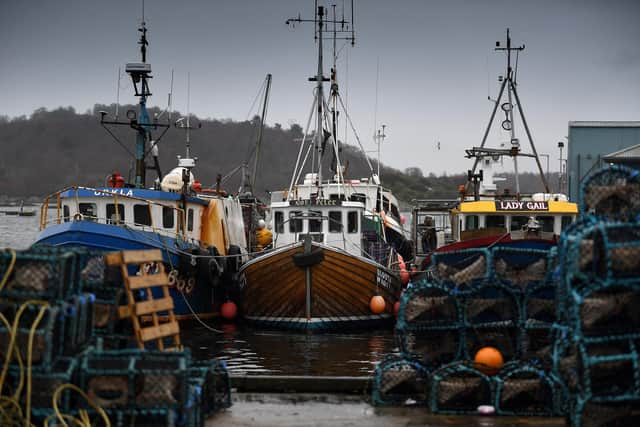Misinformation from 'big corporate fishing interests’ partly to blame for HPMAs row, says Green MSP
The controversy surrounding plans to ban fishing in at least 10 per cent of Scotland's seas is partly driven by misinformation pushed by "big corporate interests in the fishing industry" and opposition politicians, a Green MSP has said.
Ross Greer said Scotland's marine environment had been "particularly devastated" over the last three or four decades, and Highly Protected Marine Areas (HPMAs) offered a “brilliant opportunity” to help secure the viability of coastal communities.
Advertisement
Hide AdAdvertisement
Hide AdElspeth Macdonald, chief executive of the Scottish Fishermen’s Federation, accused him of an “outrageous slur” and “astounding” ignorance.


Ministers insist HPMAs will conserve marine ecosystems while providing economic and social benefits. The plans would place strict limits on some human activities, such as fishing and aquaculture, and are a key part of the co-operation agreement between the SNP and the Greens.
However, they have sparked a huge backlash. Representatives from Scotland’s seafood sector recently launched an unprecedented campaign against HPMAs, which they say would have a catastrophic impact.
Speaking to Scotland on Sunday, Mr Greer pointed to the existing no-take zone at Lamlash Bay on Arran, which he said had been "massively successful" and had boosted the fishing industry.
He said: “We are perfectly well aware that there are a lot of people out there who have serious and significant concerns about HPMAs. That is in part because our opponents in the, essentially big fishing industry interests – not your local trawlers, family-owned boats, but big corporate interests in the fishing industry – alongside the Conservative and Labour parties, have been pushing a lot of misinformation about this.


"There are people out there who believe that we're going to essentially force proposals on local communities that they don't want, when actually what we're doing is giving local communities a massive opportunity, and we want to work with the communities that are actually interested in this.
"And we know that there are island communities – I'm not in a position to say who at the moment, because the consultation analysis is still taking place – but there are loads of informal conversations taking place at the moment with island communities who are really interested in this, because they see their local economy changing.”
Mr Greer said HPMAs give fish stocks an opportunity to recover and also provide other employment opportunities, such as in marine tourism. He added: "What's important, then, about the next stage of this conversation is speaking to the people who are opposed to them and understanding what their concerns are.
Advertisement
Hide AdAdvertisement
Hide Ad"There are some people who will be opposed to greater marine protection no matter what, particularly your big corporate fishing interests who literally do just want to fish the seas until there's nothing left and then they'll move on elsewhere.
"Those people have no interest in the economic security of coastal communities. That's not what they're there for. We want to secure the economic future of these communities. We want to secure the future of these communities, full stop."
Asked if he included groups such as the SFF or Salmon Scotland in his definition of big corporate fishing interests, Mr Greer said: "There are certainly people involved in both of those organisations who I would say absolutely represent big corporate interests. They are not interested in securing the future of coastal communities. They are not interested in securing the future of families who have relied on fishing for employment for generations. People in that second category are absolutely involved in the SFF as well."
Ms Macdonald said: “Ross Greer’s words are an outrageous slur on the fishing industry and the fishing crews who risk life and limb daily to put low carbon, healthy, protein food on our tables. His ignorance about the nature of this largely family-owned sector which has an obvious interest in fishing sustainably – lest they deny themselves and their sons and daughters their livelihoods – is astounding.
“Our vessels have been fishing for generations in the same Scottish waters, and want to continue doing so, which is why they are so committed to sustainability. They are as far removed from fishing out our waters and moving on as you can get.
“In the almost 50 years of the SFF’s existence the only ‘big corporate interests’ we have come across are those who fund the environmental lobbyists that so aggressively and animatedly mislead the general public about the wholly legitimate activities of fishermen.
“If Mr Greer talks to people in our coastal communities and people who work in the fishing industry he will find that they are implacably opposed to HPMAs, which would ban fishing in 10 per cent of our waters, because they recognise that they will devastate these communities without any good, evidence-based reason for their introduction.”
A Scottish Government spokeswoman said the fishing industry “is highly diverse and plays an essential role supporting jobs and the local economy on our islands and in our coastal communities”. She added: “Our proposals for HPMAs are at a very early stage and no sites have been selected. We are working with island and coastal communities and marine industries to ensure their concerns and views are listened to and understood.”
Comments
Want to join the conversation? Please or to comment on this article.
